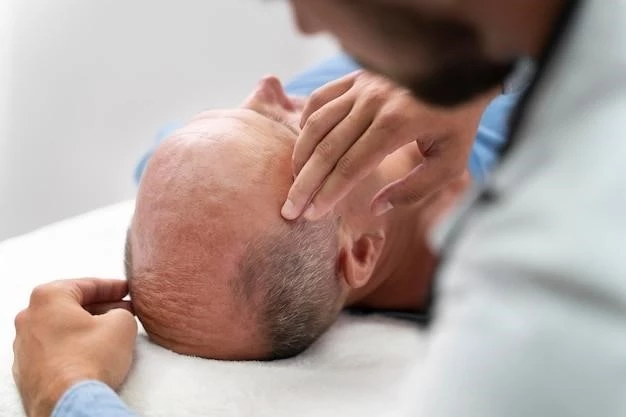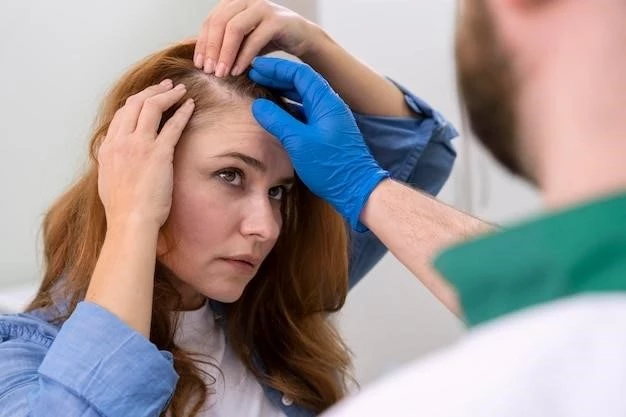Understanding Lichen Planus Follicularis
Lichen planus follicularis is a skin disorder that affects the hair follicles on the scalp‚ leading to inflammation‚ itching‚ and lesions. Treatment options include corticosteroids‚ immunosuppressants‚ topical creams‚ antihistamines‚ and phototherapy. A dermatologist can diagnose the condition through a biopsy.
Overview of Lichen Planus Follicularis
Lichen planus follicularis is a rare variant of lichen planus‚ an autoimmune skin disorder. It specifically targets the hair follicles‚ most commonly on the scalp. The condition is characterized by inflamed‚ itchy papules that may develop into larger lesions. Lichen planus follicularis can cause scarring hair loss if left untreated.
The exact cause of this condition is not fully understood‚ but it is believed to involve an abnormal immune response. It is important to seek medical attention if you suspect you have lichen planus follicularis. A dermatologist can provide a proper diagnosis through a skin biopsy and recommend an appropriate treatment plan.
While lichen planus follicularis is not contagious‚ it can be a chronic condition that requires ongoing management. Various treatment options are available‚ including corticosteroids‚ immunosuppressants‚ topical creams‚ antihistamines‚ and phototherapy. These can help reduce inflammation‚ alleviate itching‚ and promote healing of the lesions.
Living with lichen planus follicularis may require lifestyle adjustments to minimize triggers that exacerbate symptoms. Regular follow-ups with a dermatologist are essential to monitor the condition and adjust the treatment plan as needed. With proper care and management‚ individuals with lichen planus follicularis can effectively control the symptoms and improve their quality of life.
Causes and Symptoms of Lichen Planus Follicularis
The exact cause of lichen planus follicularis is not well understood‚ but it is believed to be an autoimmune condition where the body’s immune system mistakenly targets the hair follicles on the scalp. This results in inflammation and damage to the follicles‚ leading to the characteristic symptoms of the disorder.
Symptoms of lichen planus follicularis include red or purple‚ raised‚ itchy bumps on the scalp that may develop into rough patches or larger lesions. Hair loss can occur in the affected areas‚ and scarring may result from prolonged inflammation. The itching associated with the condition can vary in intensity and may be a significant source of discomfort for individuals.
While the exact triggers for lichen planus follicularis flare-ups are not fully understood‚ factors such as stress‚ certain medications‚ and infections may play a role. It is essential for individuals experiencing symptoms of lichen planus follicularis to consult a dermatologist for a proper diagnosis and treatment plan.
Diagnosis of lichen planus follicularis typically involves a thorough examination of the scalp and may require a skin biopsy to confirm the condition. Once diagnosed‚ treatment options like corticosteroids‚ immunosuppressants‚ topical creams‚ antihistamines‚ and phototherapy can help manage symptoms and improve the health of the scalp.
Understanding the Skin Disorder
Lichen planus follicularis is a skin disorder that specifically affects the hair follicles on the scalp. It is considered a variant of lichen planus‚ an autoimmune condition where the immune system mistakenly attacks healthy cells. In the case of lichen planus follicularis‚ this immune response targets the hair follicles‚ leading to inflammation and a range of symptoms.
Individuals with lichen planus follicularis may experience itching‚ red or purple bumps‚ rough patches‚ and lesions on the scalp. Hair loss can occur in the affected areas‚ and if left untreated‚ scarring may develop. The condition can vary in severity‚ with some individuals experiencing intermittent flare-ups while others may have a chronic form of the disorder.
Managing lichen planus follicularis involves understanding potential triggers that exacerbate symptoms and working with a healthcare provider to develop a treatment plan. While the condition is not contagious‚ it can have a significant impact on an individual’s quality of life due to discomfort‚ itching‚ and changes in scalp appearance.
By raising awareness about lichen planus follicularis and its effects on the scalp‚ individuals can become better equipped to seek appropriate medical care‚ receive a proper diagnosis from a dermatologist‚ and explore treatment options that can help alleviate symptoms and promote scalp health.
Diagnosis of Lichen Planus Follicularis
Diagnosing lichen planus follicularis often involves a thorough examination of the scalp by a dermatologist. The healthcare provider will assess the scalp for the characteristic symptoms of the condition‚ including red or purple bumps‚ itching‚ and hair loss. In some cases‚ a skin biopsy may be necessary to confirm the diagnosis.
A skin biopsy involves taking a small sample of skin tissue from the affected area and examining it under a microscope. This procedure can help differentiate lichen planus follicularis from other skin disorders with similar symptoms. Additionally‚ the dermatologist may inquire about the individual’s medical history and any known triggers that may exacerbate symptoms.
It is essential to seek professional medical advice if you suspect you have lichen planus follicularis‚ as early diagnosis and intervention can help manage the condition effectively. A dermatologist is specially trained to diagnose and treat various skin disorders‚ including lichen planus follicularis‚ and can recommend an appropriate treatment plan based on the individual’s specific symptoms and medical history.
By undergoing a comprehensive evaluation and obtaining a definitive diagnosis from a dermatologist‚ individuals with lichen planus follicularis can access the necessary care and support to improve their scalp health and overall quality of life. Regular monitoring and follow-ups with the healthcare provider are crucial to track the progress of the condition and adjust treatment as needed.
Treatment Options for Lichen Planus Follicularis
There are several treatment options available to manage lichen planus follicularis and alleviate its symptoms. Treatment plans are usually tailored to the individual’s specific symptoms and the severity of the condition. Common treatment approaches include⁚
- Corticosteroids⁚ These can be applied topically to reduce inflammation and itchiness on the scalp.
- Immunosuppressants⁚ Medications that suppress the immune response can help control the autoimmune reactions in lichen planus follicularis.
- Topical creams⁚ Creams containing ingredients like calcineurin inhibitors may be prescribed to manage symptoms.
- Antihistamines⁚ These can help reduce itching associated with lichen planus follicularis.
- Phototherapy⁚ Treatment with ultraviolet light under medical supervision may be recommended in some cases to improve symptoms.
It is important to follow the treatment plan prescribed by a dermatologist carefully and attend regular follow-up appointments to monitor progress. Depending on the individual’s response to treatment‚ adjustments may be made to ensure the most effective management of lichen planus follicularis.
In severe cases where conservative treatments do not provide sufficient relief‚ systemic medications or more intensive therapies may be considered. These options are typically reserved for refractory cases and require close monitoring for potential side effects.
By working closely with a dermatologist and following the prescribed treatment regimen‚ individuals with lichen planus follicularis can better manage their symptoms‚ reduce inflammation‚ and improve the health of their scalp. It is important to communicate any concerns or changes in symptoms to the healthcare provider to optimize treatment outcomes.
Seeking Professional Help
If you suspect you have lichen planus follicularis or are experiencing symptoms such as scalp inflammation‚ itching‚ or unusual bumps‚ it is crucial to seek professional help from a dermatologist. Dermatologists are trained to diagnose and treat various skin disorders‚ including lichen planus follicularis.
During your consultation‚ the dermatologist will conduct a comprehensive evaluation of your scalp‚ inquire about your symptoms and medical history‚ and may perform a skin biopsy to confirm the diagnosis. This thorough assessment allows the healthcare provider to develop a personalized treatment plan tailored to your specific needs and condition severity.
Professional help is essential in managing lichen planus follicularis effectively. The dermatologist can recommend appropriate treatment options‚ prescribe medications such as corticosteroids or immunosuppressants‚ and provide guidance on lifestyle modifications to minimize triggers and promote scalp health.
Regular follow-up appointments with the dermatologist are crucial to monitor the progress of the condition‚ adjust the treatment plan as needed‚ and address any concerns or changes in symptoms. Seeking professional help ensures that you receive the specialized care and support required to manage lichen planus follicularis and improve your quality of life.
Living with Lichen Planus Follicularis
Living with lichen planus follicularis can present challenges‚ but with proper management and support‚ individuals can enhance their quality of life. It is essential to follow the treatment plan prescribed by a dermatologist diligently and attend regular follow-up appointments to monitor the condition’s progress.
Self-care strategies can also play a vital role in managing lichen planus follicularis. These may include gentle scalp care routines‚ avoiding potential triggers like harsh hair products or stress‚ and protecting the scalp from excessive sun exposure. Maintaining good scalp hygiene and staying hydrated can also benefit scalp health.
Support groups or online communities can provide valuable resources and a platform to connect with others experiencing lichen planus follicularis. Sharing experiences‚ tips‚ and coping mechanisms with peers can offer emotional support and practical insights for living with the condition.
If emotional or psychological challenges arise due to lichen planus follicularis‚ seeking counseling or therapy may be beneficial. Managing stress and maintaining a positive outlook can contribute to overall well-being and help individuals navigate the impact of the condition on their daily lives.
By adopting a holistic approach to wellness‚ incorporating medical treatments‚ self-care practices‚ and emotional support‚ individuals with lichen planus follicularis can effectively manage their symptoms‚ reduce discomfort‚ and optimize scalp health. With a proactive attitude and a supportive healthcare team‚ it is possible to lead a fulfilling life while living with lichen planus follicularis.
Conclusion
In conclusion‚ lichen planus follicularis is a challenging skin disorder that affects the hair follicles on the scalp‚ leading to inflammation‚ itching‚ and lesions. Seeking professional help from a dermatologist is crucial for an accurate diagnosis and personalized treatment plan.
With a range of treatment options available‚ including corticosteroids‚ immunosuppressants‚ topical creams‚ antihistamines‚ and phototherapy‚ individuals can effectively manage lichen planus follicularis and improve their scalp health.
Living with lichen planus follicularis requires diligence in following the prescribed treatment regimen‚ adopting self-care strategies‚ and seeking emotional support when needed. By addressing the physical‚ emotional‚ and psychological aspects of the condition‚ individuals can enhance their quality of life and well-being.

By raising awareness about lichen planus follicularis‚ promoting early detection‚ and encouraging comprehensive management approaches‚ the impact of this skin disorder can be minimized‚ and individuals can better navigate the challenges it presents.
Through collaborative efforts between healthcare providers‚ individuals with lichen planus follicularis‚ and support networks‚ it is possible to effectively manage the symptoms‚ reduce discomfort‚ and promote scalp health. With the right tools and resources‚ living with lichen planus follicularis can become more manageable‚ ultimately improving the overall quality of life for those affected by this condition.
